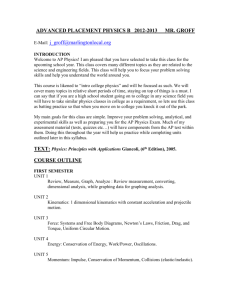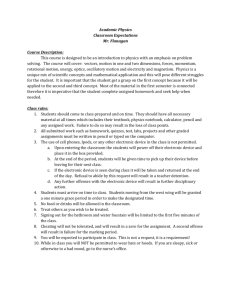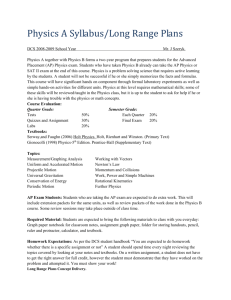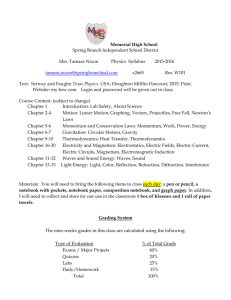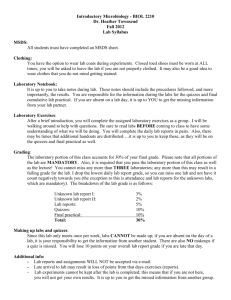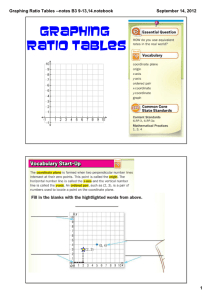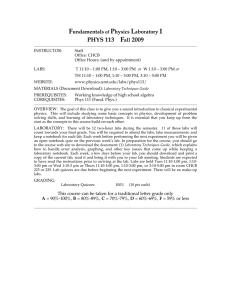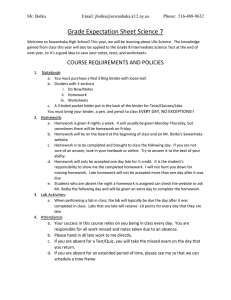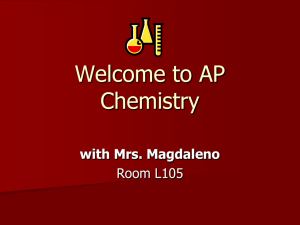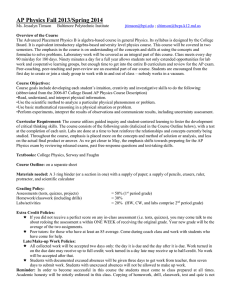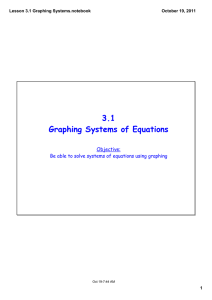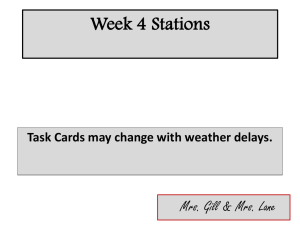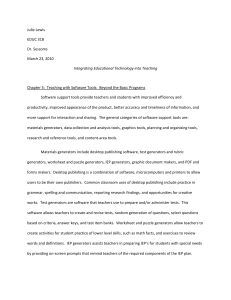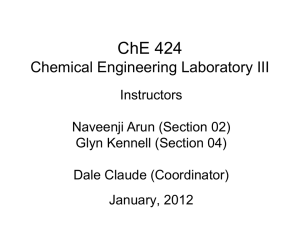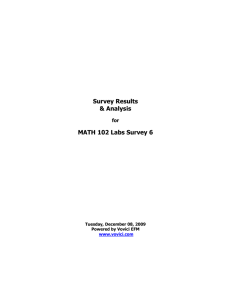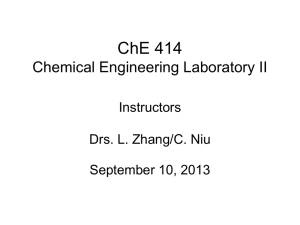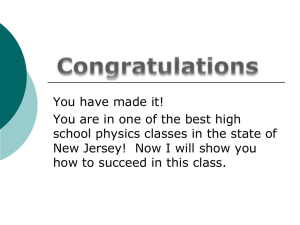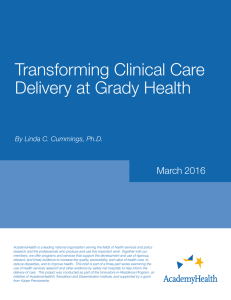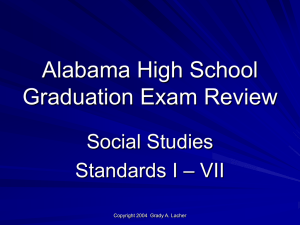AP Physics B Syllabus 2011-2012 Grady High School Instructor: Jeff
advertisement
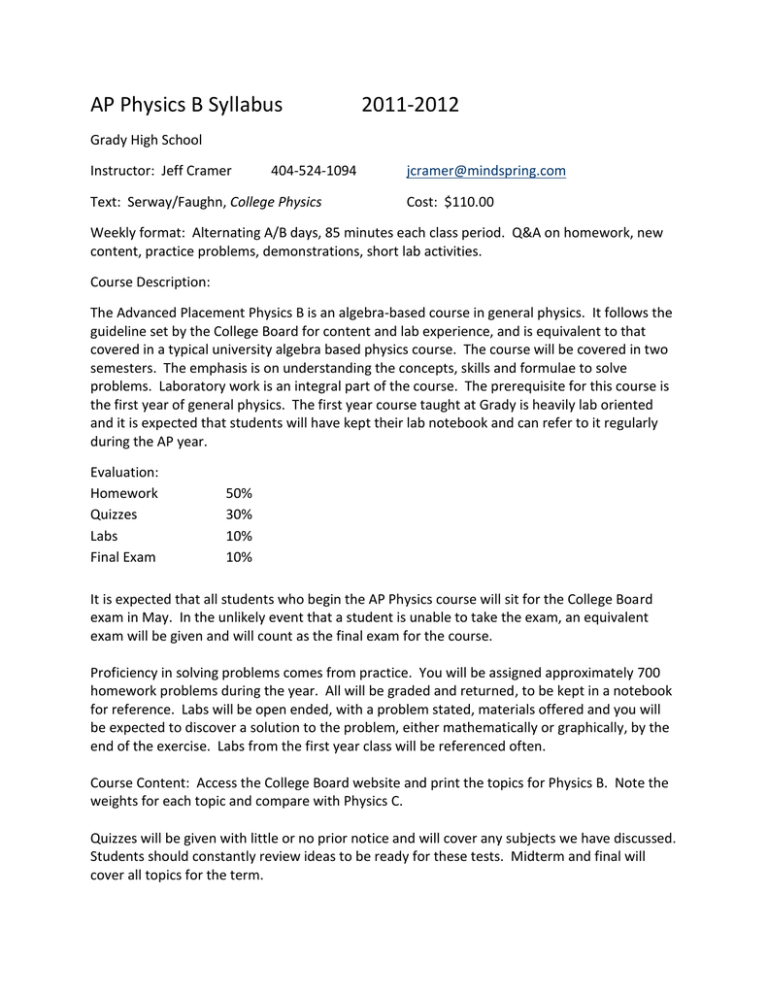
AP Physics B Syllabus 2011-2012 Grady High School Instructor: Jeff Cramer 404-524-1094 Text: Serway/Faughn, College Physics jcramer@mindspring.com Cost: $110.00 Weekly format: Alternating A/B days, 85 minutes each class period. Q&A on homework, new content, practice problems, demonstrations, short lab activities. Course Description: The Advanced Placement Physics B is an algebra-based course in general physics. It follows the guideline set by the College Board for content and lab experience, and is equivalent to that covered in a typical university algebra based physics course. The course will be covered in two semesters. The emphasis is on understanding the concepts, skills and formulae to solve problems. Laboratory work is an integral part of the course. The prerequisite for this course is the first year of general physics. The first year course taught at Grady is heavily lab oriented and it is expected that students will have kept their lab notebook and can refer to it regularly during the AP year. Evaluation: Homework Quizzes Labs Final Exam 50% 30% 10% 10% It is expected that all students who begin the AP Physics course will sit for the College Board exam in May. In the unlikely event that a student is unable to take the exam, an equivalent exam will be given and will count as the final exam for the course. Proficiency in solving problems comes from practice. You will be assigned approximately 700 homework problems during the year. All will be graded and returned, to be kept in a notebook for reference. Labs will be open ended, with a problem stated, materials offered and you will be expected to discover a solution to the problem, either mathematically or graphically, by the end of the exercise. Labs from the first year class will be referenced often. Course Content: Access the College Board website and print the topics for Physics B. Note the weights for each topic and compare with Physics C. Quizzes will be given with little or no prior notice and will cover any subjects we have discussed. Students should constantly review ideas to be ready for these tests. Midterm and final will cover all topics for the term. Laboratory List: Students are expected to be able to gather and analyze data for the following concepts. Graphing density Graphing motion, constant velocity and acceleration Prediction and reproduction of kinematic graphs with a motion detector Determination of acceleration due to gravity Projectile motion, graphing Measurement of Hook’s Law constant for a spring Coefficient of friction – graphical analysis Centripetal force and Newton’s Law Derivation of Newton’s second law from graphical analysis Simple pendulum with a photogate Conservation of momentum in collisions on an air track Conservation of momentum in two dimensional collisions Measurement of specific heat of metals Measurement of coefficient of linear expansion in metals Prediction of period of oscillation of a mass on a spring Ohm’s Law in a simple circuit Resistors in series and parallel, Kirchhoff’s laws Exponential decay in a capacitor, measuring capacitance from area under a curve Measuring the speed of a standing wave Speed of sound from resonance in a tube Measuring image distance for curved mirrors and lenses – ray diagrams Determining diffraction grating constant using a laser Investigation of mechanical waves in a ripple tank Waves in a coiled spring The AP Physics B exam will be given May 7th, 2012 at 12:00 noon. The exam consists of 70 multiple choice questions in a 90 minute time period. This is followed by 6-8 free response questions in a second 90 minute slot. Students my use calculators and an equations sheet on the free response, but not on the multiple choice portion. There is no penalty for missed multiple choice questions, so educated guesses are encouraged. Each student should do homework problems independently, but small groups are encouraged to work together to discuss concepts and check answers with each other. Show all steps in the solutions. We will try to cover all topics in the text by spring break. The time after the break will be devoted to working sample problems from released exams. I will be available for after school and evening group sessions the two or three weeks before the AP exam if you need to discuss specific problem types and practice working old exams problems. Let’s work together. ____________________________________________________________________________ Student agreement ___________________________________________ Date _________ Parent agreement ____________________________________________ Date _________
